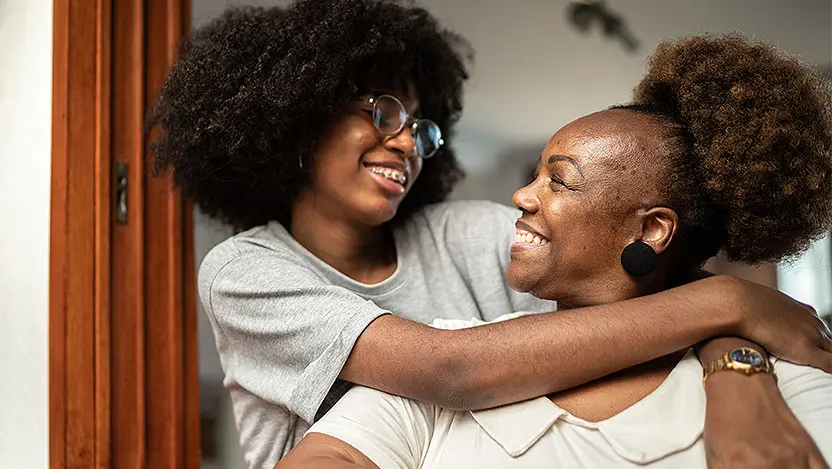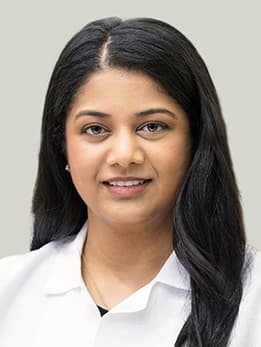Normal teen menstrual cycles: When to see a gynecologist

While entering puberty is a natural part of growing up, the physical changes it brings can be unsettling. For those who menstruate, experiencing a period for the first time can raise a lot of questions about whether what’s going on is normal or not. As pediatric and adolescent gynecologists, we’re here to help you navigate and understand those early cycles.
Find an Adolescent Gynecologist
When do teens and preteens typically get their first periods?
Most adolescents get their first period between ages 10 and 15. Twelve is considered an “average” age for menarche — the start of the menstrual cycle. Some individuals may find that they begin their period around the same age that other family members had theirs, but this is not always the case.
Having an earlier or later first period is not necessarily a sign that something is wrong. Some children may have their first period when they are just nine years old. Similarly, some people might not get their period until they are 15 or 16, especially if other female family members were “late bloomers.”
Children usually have their first period about two to three years after their breasts begin to develop and between six to 12 months after they begin to experience vaginal discharge. These can be helpful signs to watch out for if you are concerned whether your child is too old or too young to be experiencing their first period.
What are the signs of a first period? What are some of the common symptoms?
For many people, their first period comes as a complete surprise, but there can sometimes be signs that it is arriving, such as pimples, bloating, mood changes or cramps. Usually, a first period is preceded by other puberty symptoms, such as the growth of pubic hair, breast development, and body shape changes.
A first period may be light or heavy right away, and period blood can range in color from brown to dark red. First periods can include many of the usual symptoms of a period, including:
- Cramping in the abdomen, back or upper legs
- Acne breakouts
- Breast tenderness
- Mood changes
- Sleep changes
- Digestive issues, such as bloating or diarrhea
Often, when a person begins menstruating, their cycle doesn't become regular right away. For the first few years, it may begin at a different time of the month, or a person may experience different premenstrual or menstrual symptoms, including heavier or lighter bleeding. For most people, their cycles get more regular with time, and the onset and symptoms become more predictable.
What should I do when my child starts their period?
Plan ahead and be prepared.
It is best to be prepared for your child’s first period by having menstrual hygiene supplies in the home, and discussing what they should expect to experience before their period begins, so that it is not a complete surprise. Make sure they understand what causes a period, what kinds of symptoms they might experience, and most importantly that they know that periods are a normal and healthy part of having a female body. You might wish to put together a “period preparation” kit that they can keep in their locker or backpack, with a couple of menstrual pads, wet wipes and a clean pair of underwear, in case their first period arrives while they are in school.
Celebrate the milestone.
It can be helpful to “celebrate” or mark the first period in some significant way, such as with a card, a favorite sweet treat, or an at-home spa night. If your child is interested, you might also consider a larger celebration, such as a party or sleepover with your child’s friends. The key is to help your child view this transition toward adulthood as a positive and natural event, not something that is shameful or embarrassing.
Help them understand their options for hygiene products.
You can offer your child their choice of hygiene products. Common options include pads, tampons, and menstrual cups. Often, those getting their first periods find pads to be the easiest and most comfortable option. Period underwear is a new option and can be another easy-to-use method for menstrual hygiene.Tampons and menstrual cups can be good options for those who are active in sports, but can take some time to get used to inserting and removing. It’s important to note the instructions provided by the product of choice, as there are limitations on how certain products can be used. Help your child understand the differences between the options and choose one that works best for them.
Help them learn to manage their symptoms.
Offer comfort measures such as:
- Child-safe painkillers and a heating pad or hot water bottle for cramps
- Comfort foods and emotional support if they are experiencing mood changes or food cravings
- Skincare products for acne outbreaks
- Space and time for honest conversations
What are the signs of an abnormal period, and when should we talk to our pediatrician?
Abnormal periods can be caused by everything from lifestyle factors such as stress and exercise levels to underlying medical conditions such as a bleeding disorder or hormonal abnormalities. It can take a few years for the menstrual cycle to stabilize, so it might not be obvious right away if your child is experiencing abnormal periods, but there are some signs that you can watch out for.
Make an appointment for your child to see their pediatrician if you observe any of the following:
- Reaching the age of 15 without having a period
- Having a period before the age of eight
- Experiencing irregular cycles more than two years after starting their period
- Experiencing very heavy bleeding (bleeding through a pad or tampon in an hour or less) or severe cramps that don’t improve with painkillers
- Having very long periods (bleeding for more than a week)
- Experiencing severe PMS symptoms that make it hard for your child to get through their day
These symptoms don’t necessarily indicate that anything is wrong, but it’s good to speak with a healthcare provider just to make sure. A healthcare provider can help you and your child determine what next steps need to be taken to ensure their health and wellbeing.
If your child also has other types of bleeding such as nosebleeds, frequent gum bleeding, easy bruising or bleeding after tooth extraction or surgery, or any family history of bleeding, you may want to discuss with your pediatrician whether testing for an inherited or acquired bleeding disorder is needed.
When should children and teens see a gynecologist?
Everyone’s health journey is unique, and there’s no universal rule for when a young person should begin routine care with a gynecologist. Deciding on the right time is a personal choice that should involve open discussion between you, your child, and their pediatrician.
If your child begins to show signs of puberty before about the age of eight, such as developing breast buds, make sure you help them understand the changes in their body, and consider making a visit to your pediatrician. Your child may be experiencing early puberty, and a healthcare provider can help you determine whether there is anything to be concerned about. Similarly, if your child has reached age 15 and has not yet begun their period, consider making an appointment. Factors such as weight (too low or too high), stress levels and exercise frequency and intensity can influence when a child begins their menstrual cycle.
As your child continues to go through puberty, consider making them an appointment with an adolescent gynecologist. These specialized providers can offer education and care for your child’s growing body and help them understand the changes they are experiencing. The first appointment is focused on patient education and does not typically require a pelvic examination.
Whether your child is ready to take a proactive role in managing their health and wellness, or they’re experiencing symptoms that require specialized care, visiting a gynecologist offers valuable benefits.
Personal Health and Hygiene Education
The first visit not only provides an opportunity for teens and preteens to ask their questions, but it also gives the gynecologist a chance to offer important, age-appropriate patient education.
General topics covered during the first visit may include:
- Basic hygiene
- Normal versus abnormal vaginal discharge
- Puberty
- Menstruation
Wellness Exams and Assessments
Depending on the patient’s individual needs, the gynecologist may:
- Discuss physical and emotional development
- Review medical history
- Perform a basic pelvic exam and/or breast exam (typically not during the first visit)
- Offer possible solutions to address symptoms or other concerns
It’s understandable that teens and preteens may often feel anxiety, nervousness or even fearful about wellness procedures, such as their first pelvic exam or breast exam. Although, these exams may be performed under certain circumstances at this age, they typically become routine at age 21. When an exam is necessary at a younger age, starting with a pediatric and adolescent gynecologist is ideal, because we offer unique expertise in providing the best gynecologic care possible for children, adolescents and young adults.
Our goal is to make the experience as positive as possible, helping our patients to understand the benefits of routine wellness and preventive care at an early age.
A Trusted, Credible Source for Safe and Private Health Discussions
Our goal is to make the experience as positive as possible, helping our patients to understand the benefits of routine wellness and preventive care at an early age. Starting at age 12, we offer teens and preteens the opportunity to include a private, confidential discussion with their gynecologist during their visit. This practice, endorsed by leading medical organizations, encourages adolescents to ask sensitive health questions in a safe space. It also helps foster independence as they grow into young adults, empowering them to understand and take charge of their personal health journey.
Understanding the Menstrual Cycle
A visit with an adolescent gynecologist can help teens and preteens learn about the menstrual cycle and what is considered normal or abnormal. Many times, this can be an opportunity to offer solutions for issues such as:
- Heavy bleeding
- Irregular menstrual bleeding
- Painful menstrual cramps
- Premenstrual syndrome (PMS) or premenstrual dysphoric disorder (PMDD)
HPV Vaccination
Teens and preteens can also get the HPV vaccine at their gynecologist’s office. The HPV vaccine helps protect adolescents from the human papillomavirus (HPV), which is known to lead to more than six types of cancer.
The Centers for Disease Control and Prevention recommends two doses of the HPV vaccine: the first between ages 11 and 12, and the second six months later. If the child waits until age 15, they will need three doses of the vaccine.
Schedule an Appointment Online
Sex Education
It may be difficult for an adolescent to talk to parents, guardians or other adults they know about sex. However, it is imperative that they have an opportunity to have these conversations with someone who can provide accurate information. A pediatric and adolescent gynecologist can answer questions and provide education about topics such as:
- Sexually transmitted infections
- Birth control and pregnancy prevention
- Safe and healthy intimate relationships
- Gender identity
- LGBTQ+ topics
- Having sex for the first time
Diagnosis and Treatment for Gynecologic Conditions
For teens and preteens who have gynecologic conditions or symptoms, forming a doctor-patient relationship connects them with an expert who is poised to provide the specialized care they need. Pediatric and adolescent gynecologists are trained to manage the intricate health needs of children, teens and young adults.
Learn more about specialized gynecologic care for:

About Jessica Long, MD
As a pediatric and adolescent gynecologist, Jessica Long, MD, provides gynecologic care for children and teenagers, including congenital anomalies, menstrual disorders, and other gynecologic conditions.

About Shashwati Pradhan, MD
Shashwati Pradhan, MD, is a pediatric and adolescent gynecologist. She specializes in helping children, teens and young adults navigate gynecologic conditions while minimizing nervousness, embarrassment and worry.
Learn more about Dr. Pradhan